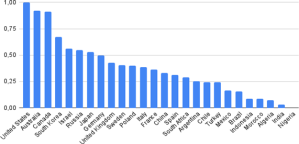From Jorge Buzaglo and Leo Buzaglo Olofsgård and current RWER issue Ecological Damage Index The ecological dimension of the extended failure index includes only one indicator. There are of course many other sources of ecological damage, but climate warming is by far the most dangerous and urgent. GHG per capita emissions: That is, the annual greenhouse gas emissions of the average individual in the country. The personal GHG footprint reflects the country’s average individual damage to the atmosphere. (Source: WIR22). The United States, Australia, and Canada are in a special category of very high (per capita) GHG emitters. The lowest emitters are low-income countries. next the Exclusion Index or read more now about failure indexes here
Topics:
Editor considers the following as important: Uncategorized
This could be interesting, too:
tom writes The Ukraine war and Europe’s deepening march of folly
Stavros Mavroudeas writes CfP of Marxist Macroeconomic Modelling workgroup – 18th WAPE Forum, Istanbul August 6-8, 2025
Lars Pålsson Syll writes The pretence-of-knowledge syndrome
Dean Baker writes Crypto and Donald Trump’s strategic baseball card reserve
from Jorge Buzaglo and Leo Buzaglo Olofsgård and current RWER issue
Ecological Damage Index
The ecological dimension of the extended failure index includes only one indicator. There are of course many other sources of ecological damage, but climate warming is by far the most dangerous and urgent.
- GHG per capita emissions: That is, the annual greenhouse gas emissions of the average individual in the country. The personal GHG footprint reflects the country’s average individual damage to the atmosphere. (Source: WIR22).
The United States, Australia, and Canada are in a special category of very high (per capita) GHG emitters. The lowest emitters are low-income countries.
next the Exclusion Index
or read more now about failure indexes here

